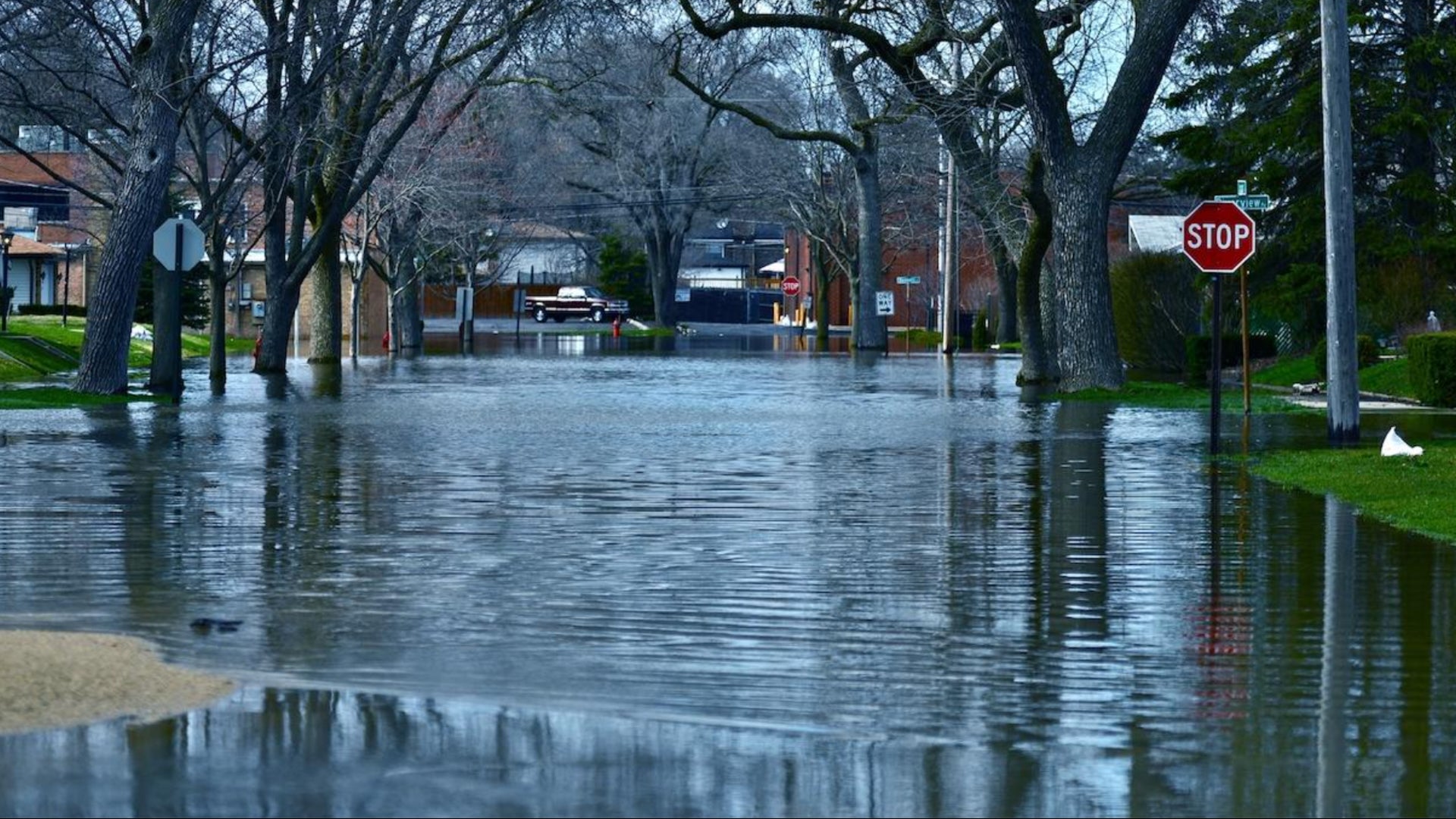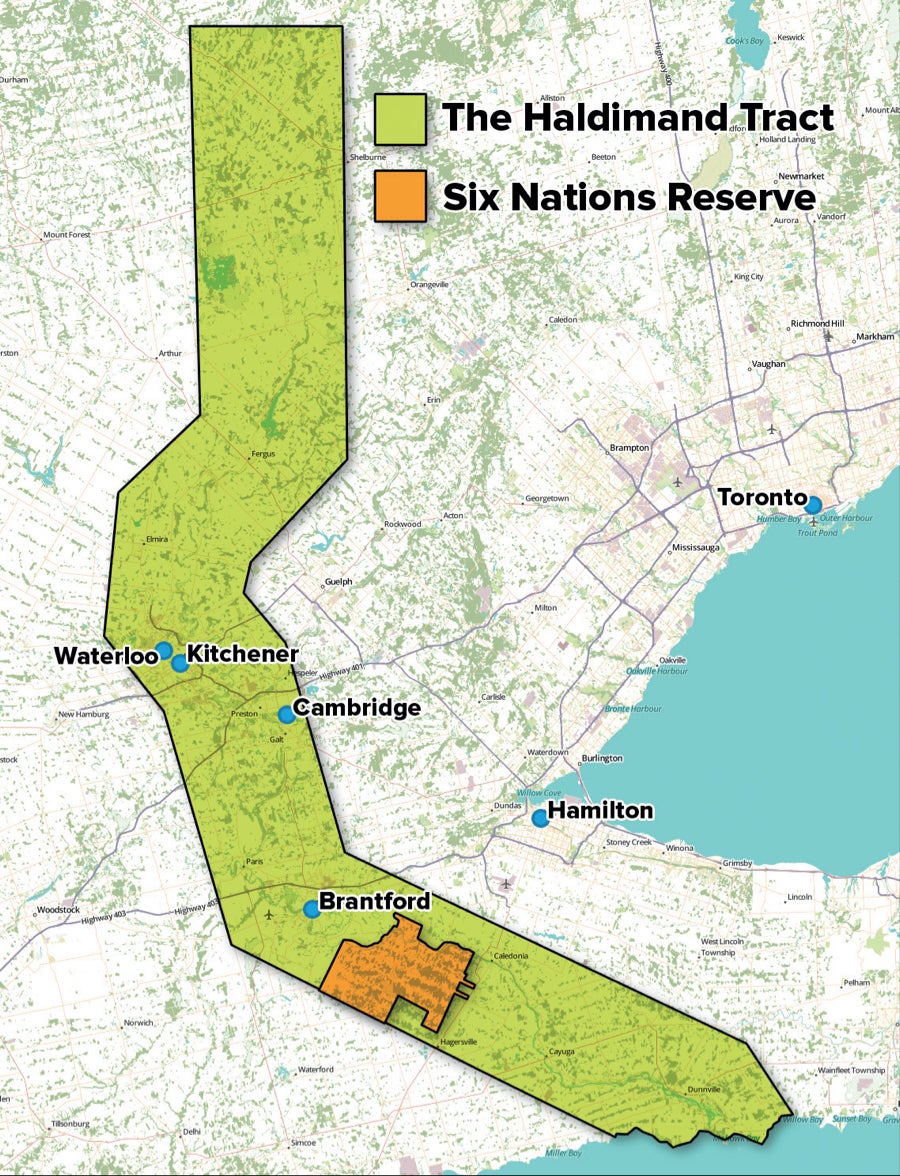- Today is Black Mental Health Day
- It's Open Education Week this week
- With spring around the corner, Canadian cities score an uninspiring C+ on flood preparedness
- Jay Krishnan appointed CEO of the Accelerator Centre
- Indigenous Initiatives Office offers resources on treaty rights and relationships
- Nutrition Month returns for a tenth year and other notes
Editor:
Brandon Sweet
University Communications
bulletin@uwaterloo.ca
Today is Black Mental Health Day

A message from Human Rights, Equity and Inclusion.
Today, March 1, marks the second annual Black Mental Health Day across Ontario. The TAIBU Community Health Centre in Toronto, along with the Black Health Alliance, were instrumental in organizing the first Black Mental Health Day in 2020.
Today provides an opportunity to draw attention to the impacts that anti-Black racism have on the mental health of Black people as they navigate the health and social systems across Ontario. Currently, health providers do not collect race-based and social-demographic data, so we don’t have a clear national picture of gaps in health and wellbeing, including mental health for Black and other racialized individuals. Despite this, in a recent study by the Black Health Alliance it is clear there are racial differences in mental health outcomes for the Canadian Black population.
The goals of Black Mental Health Day are not only to raise awareness about Black mental health and health inequities, but also to highlight the ways that mental health is prioritized and achieved. This is often done through leadership, activism, strength, and healing through various creative forms.
Strength and Healing Through the Arts
The Equity Office is seeking to create space to explore creative and restorative paths to healing through a community screening of the acclaimed short document, Ballet After Dark, and a discussion around themes raised in the film.
Ballet After Dark tells the story of a young woman who found the strength to survive after an attack. She created an organization that is helping sexual abuse and domestic violent survivors find healing after trauma through dance therapy. Produced by Tribeca Studios.
Date: March 26, 11:30 a.m. to 1:00 p.m.
Moderator: Kathy Hogarth, Special Advisor to the Vice-President, Research and International on Anti-racism and Inclusivity.
Panelists: Naila Keleta-Mae, Associate Professor, Faculty of Arts; Trish Van Katwyk, Associate Professor, School of Social Work, Renison University College.
Register for the screening and discussion.
It's Open Education Week this week

A message from the Centre for Extended Learning (CEL).
March 1 through 5 is Open Education Week, which raises awareness of open education and its impact on teaching and learning.
Here are some events taking place this week:
- BCcampus Open Education Week, sessions offered by the organization and affiliated institutions, March 1 through 5
- Open Education Policy in the U.S. and Canada: Trends and Opportunities, Thursday, March 4, 1:00 PM
- Code of Best Practices in Fair Use for Open Educational Resources, Thursday, March 4, 2:00 PM
For further information about open education or to become involved in raising awareness, see Open Scholarship at Waterloo.
Logo image licensed under CC-BY 4.0.
With spring around the corner, Canadian cities score an uninspiring C+ on flood preparedness

This article was originally featured on Waterloo News.
Canadian cities received an uninspiring grade on flood preparedness, the costliest type of natural disaster, a new national study has found.
The study, conducted by the Intact Centre on Climate Adaptation at the University of Waterloo, shows that many cities have made little progress to limit their risk of flooding over the past five years. In a survey of 16 municipalities, cities scored an average C+ in flood-readiness in 2019/20 — the same score a near-identical study found in 2015.
The general lack of readiness means that if a large-scale flooding event were to occur this spring alongside the COVID-19 pandemic, the impact on Canadians could be “catastrophic," said Dr. Blair Feltmate, co-author of the study and head of the Intact Centre. "Many people could find themselves in harm’s way with a basement full of sewer water."
The municipalities’ scores were calculated based on detailed interviews with 53 municipal officers responsible for managing floods and emergency services across the 16 largest municipalities. Respondents included representatives of municipal governments such as city managers, directors and senior planners, and in some cases with representatives of public utilities and conservation authorities who had relevant expertise.
Among the study’s key findings:
- Six cities—including some that experienced severe floods in recent years—were slightly less prepared for flooding in 2019/20 than they were in 2015.
- Comprehensive and up-to-date flood maps, supported by funding from Public Safety Canada, should be mandatory for a city to qualify for federal flood-recovery aid, according to municipal managers.
- Only half of the 16 cities assess the potential for municipal stormwater to back up into basements, even though basement flooding is the No. 1 catastrophic cost to homeowners and insurers.
Municipal officers repeatedly warned that cities must do a better job of preparing for floods, or risk another spring of sandbagging, generally at the last minute.
There is some positive news: Edmonton, Regina and Toronto improved their flood-preparedness scores, each achieving a B+, primarily for protecting health-care facilities such as hospitals, clinics and retirement homes. These cities also put in place measures to maintain continuity of electricity, telecommunications, water and wastewater services during floods. Edmonton also provides free flood-risk assessments for homeowners through its municipally owned utility, EPCOR. It is the only city to do so.
“Flood-readiness is key to societal resilience,” said Veronica Scotti, Chairperson Public Sector Solutions, Swiss Re and Intact Centre Advisory Council member. “By learning from one another, these cities could make much-needed progress on climate resilience. This would include maintaining a city-level risk management framework and outcome-oriented adaptation plans.”
Last year, insurable losses in Canada reached $2.5 billion, making 2020 the fourth-worst year for insurable claims since record keeping began in 1983. Climate change, aging municipal infrastructure and residential housing, and the accelerating loss of protective natural infrastructure such as wetlands contribute to flooding and the rising costs to governments, businesses and homeowners.
Read the full report card for major Canadian cities on the Waterloo News site.
Jay Krishnan appointed CEO of the Accelerator Centre

The Accelerator Centre’s Board of Directors has announced the appointment of Jay Krishnan as Chief Executive Officer effective March 1, 2021.
Krishnan joins the Accelerator Centre (AC) with an impressive resume of entrepreneurial success – both as a startup founder and within the global business acceleration community. In his last role, he was a General Partner at Mantra Capital, an early-stage US-domiciled VC firm. Krishnan has a keen business acumen, a passion for working with innovative entrepreneurs, and desire to build thriving innovation communities.
Having been involved in the founding stages of 3 companies himself, he has first-hand experience in the startup lifecycle - from seeding, raising capital, scaling and exit; with one company ultimately acquired by a multi-national conglomerate. Prior to his entrepreneurial journey, Krishnan excelled in product management and product engineering roles at global multinationals including Cisco, Juniper and Cantata-Dialogic in the US and India.
Krishnan has also served as CEO of T-Hub, India’s top business accelerator, for three years. During his time with the organization, he established T-Hub as a thriving innovation ecosystem, growing the team from 1 to more than 40 internationally based staff and developing programs that supported over 300 companies and created hundreds of jobs.
“The Waterloo innovation ecosystem is known globally for excellence,” says Krishnan. We are witnessing a unique time in history where technology and startups are reshaping our future. I’ve seen first-hand the global impact this community has made, and I am excited to be part of the next story that gets written out of Waterloo Region.”
Indigenous Initiatives Office offers resources on treaty rights and relationships
A message from the Indigenous Initiatives Office.
 Last November, the Indigenous Initiatives Office hosted a series of discussions and events for Treaties Recognition Week (November 2 to 6). These events and engagement opportunities contributed to ongoing learning about where we live and work, and the importance of treaty rights and relationships.
Last November, the Indigenous Initiatives Office hosted a series of discussions and events for Treaties Recognition Week (November 2 to 6). These events and engagement opportunities contributed to ongoing learning about where we live and work, and the importance of treaty rights and relationships.
The discussions and speaker series were recorded, and can be streamed from the Treaties Recognition Week event page.
Of particular interest to many was Phil Monture’s talk on Treaties from a First Nation Perspective: The Haldimand Tract and Six Nations of the Grand River. Phil Monture is Mohawk from the Six Nations of the Grand River and from 1975 to July 2002, he was the Director of the Land Claims Research Office at the Six Nations of the Grand River. We had technical challenges during Phil’s important talk and Phil generously offered to re-record the session with us. This recording can now also be streamed from the Treaties Recognition Week event page.
Nutrition Month returns for a tenth year and other notes
"Welcome to March and Nutrition Month," writes Health Services Dietician Sandra Ace. "This is the 10th year I’ve had the pleasure of sharing some evidence-based insights with Daily Bulletin readers. It’s also a milestone in my career as a Registered Dietitian as I celebrate 40 years of being a member of this exciting and ever-evolving profession. When I think back to putting these columns together last March, I never realized, along with most others, how quickly and drastically our lives would be reshaped in the upcoming year and beyond. This myriad of changes we have experienced also includes food – how we shop for it, prepare it, eat it and relate to it. There has been some food-related good news as well as some challenges reported, and I’ll be sure to address these topics over the next few weeks."
"Along with sharing tips and links for this year’s Nutrition Month theme, Good for You, I’ll examine timely, confusing and sometimes controversial nutrition and food topics in a myth vs. fact format. Be sure to follow these in the Daily Bulletin every weekday this month. You can find Nutrition Month resources at NutritionMonth2021.ca and follow social media at #NutritionMonth. As always, you are welcome to forward comments to Sandra Ace, MPH, RD, Campus Wellness/Health Services Dietitian, via sace@uwaterloo.ca."

"When innovative technology is transferred from research to the marketplace, it can have such a transformative impact on society," says a note from GEDI. "From improving the quality of life to enhancing business production and job growth."
"In the latest webinar, the GEDI Exchange discusses how innovative technology is transferred from research to the marketplace, having a transformative impact on society. Featuring Scott Inwood, Director of Commercialization, Waterloo Commercialization Office (WatCO), and Evelyn Aleen, CEO and Co-founder, Evercloak."
Take a look at the latest webinar: GEDIx: A 30-minute Exchange featuring WatCO with Evercloak.
Link of the day
When and Where to get support
Students can visit the Student Success Office online for supports including academic development, international student resources, leadership development, exchange and study abroad, and opportunities to get involved.
Instructors can visit the Keep Learning website to get support on adapting their teaching and learning plans for an online environment.
Updated Course templates are now available within your course in LEARN to help you build and edit your content and assignment pages quickly. Support for Winter 2021 is available.
The following workshops, webinars, and events are offered by the KL team (CTE, CEL, ITMS, LIB):
Independent Remote Course Design Essentials. Self-directed, continuous self-enrollment course in LEARN.
Introduction to Assessments in PebblePad (ATLAS) (CTE7512), Monday, March 8, 2:00 p.m. to 4:00 p.m.
Employees can access resources to help them work remotely, including managing University records and privacy of personal information. Here are some tips for staying healthy while working from home.
Stay informed about COVID cases on campus by consulting the COVID case tracker.
Whether you’re a student or faculty member, the Writing and Communication Centrehas virtual services and programs to help you with all of your academic writing needs. This term we have added evening and weekend one-to-one appointments with our peer tutors, and our NEW one-to-one workshops, where you can learn the content directly from one of our writing advisors.
- Undergraduates: Work with us to brainstorm, draft, revise, and polish your assignments in one-to-one appointments. Ask questions and learn writing tips at our Instagram Live Q&A sessions, and beat isolation while improving your writing skills at the weekly PJ-friendly writing groups.
- Graduates: Meet with our advisors in one-to-one appointments. Join the online writing community at the Virtual Writing Cafés, learn how to present your work at Speak Like a Scholar, or get moving on your dissertation at Dissertation Boot Camp.
- Faculty and Instructors: Request custom workshops for your courses, join the Waterloo writing community at the Virtual Writing Cafés, or make progress on your article, book, or chapter in one-to-one meetings with our faculty specialist.
Co-op students can get help finding a job and find supports to successfully work remotely, develop new skills, access wellness and career information, and contact a co-op or career advisor.
The Centre for Career Action assists undergraduates, graduate students, postdocs, staff, faculty, and alumni through navigating career services that are right for them. You can attend a one-on-one appointment or same day drop-in session at the CCA for assistance with cover letter writing, career planning and much more. You can also book an appointment online or visit our Live Chat to connect with our Client Support Team. The CCA is here to help you.
If you feel overwhelmed or anxious and need to talk to somebody, please contact the University’s Campus Wellness services, either Health Services or Counselling Services. You can also contact the University's Centre for Mental Health Research and Treatment. Good2Talk is a post-secondary student helpline available to all students.
The Library has published a resource guide on how to avoid information overload.
The Faculty Association of the University of Waterloo (FAUW) continues to advocate for its members. Check out the FAUW blog for more information.
The University of Waterloo Staff Association (UWSA) continues to advocate for its members. Check out the UWSA blog for more information.
The Indigenous Initiatives Office is a central hub that provides guidance, support, and resources to all Indigenous and non-Indigenous campus community members and oversees the university Indigenization strategy.
The Waterloo Indigenous Student Centre, based at St. Paul’s University College, provides support and resources for Indigenous students, and educational outreach programs for the broader community, including lectures, and events.
WUSA supports for students:
Peer support (Visit https://wusa.ca/peersupport to book an appointment):
- MATES – Available Monday to Friday, 10:30 a.m. to 9:30 p.m.; Saturday and Sunday, 10:30 a.m. to 5:30 p.m. (online only)
- Support sessions available in the following languages: Cantonese, English, Hindi, Mandarin, Portuguese, Punjabi, Spanish, and Urdu.
- Glow Centre – Available Monday to Friday, 4:00 p.m. to 8:00 p.m. (online only)
- RAISE – Available Monday to Friday – Varied hours (online only)
- Women’s Centre – Available Monday to Friday, 2:00 p.m. to 5:00 p.m. (online only)
Bike Centre – Will be reopening soon. Check https://wusa.ca/bikecentre for current operating times.
Campus Response Team, ICSN, Off Campus Community and Co-op Connection all available online. Check https://wusa.ca for more details.
Food Support Service food hampers are currently available from the Turnkey Desk on weekdays from 7:30 a.m. to 7:00 p.m. in the Student Life Centre. If you have any questions please email us at foodsupport@wusa.ca.
Centre for Academic Policy Support - CAPS is here to assist Waterloo undergraduates throughout their experience in navigating academic policy in the instances of filing petitions, grievances and appeals. Please contact them at caps@wusa.ca. More information is available.
WUSA Commissioners who can help in a variety of areas that students may be experiencing during this time:
- Equity – equity@wusa.ca
- Co-op and Experiential Affairs – coop.affairs@wusa.ca
WUSA Student Legal Protection Program- Seeking legal counsel can be intimidating, especially if it’s your first time facing a legal issue. The legal assistance helpline provides quick access to legal advice in any area of law, including criminal. Just call 1-833-202-4571.
Empower Me is a confidential mental health and wellness service that connects students with qualified counsellors 24/7. They can be reached at 1-833-628-5589.
When and Where (but mostly when)
Healthy Warriors at Home. Free programming including Online Fitness, Health Webinars, Personalized Nutrition and more from Warriors Athletics and Rec. Open to students, staff, faculty and alumni. Register today.
Livestream Exercises for Waterloo staff: Join us for an energy boosting Bootcamp or a fast and effective Express Home Workout! Open to UW Staff and subsidized by the Staff Excellence Fund.
Renison English Language Institute continues to offer virtual events and workshops to help students practice their English language skills.
Warriors vs. Laurier Blood Donation Battle. Join your fellow Warriors, donate blood and help us win the Blood Battle against Laurier for a second year in a row. Set up a profile or add the PFL code: UNIV960995 to your account if you have a blood.ca account already. Questions? Contact WarriorsInfo@uwaterloo.ca.
Warrior Rec Free Programs for Students, January to February.Wide range of free opportunities available to keep students active and healthy including:Fitness Classes (On-Demand), Health and Mindfulness Webinars, Personalized Nutrition Guides, Personal Training Consultations, Small Group Training and Warrior Reset. Register today.
Drop-in to Warrior Virtual Study Halls on Wednesdays from 5:30 p.m. to 7:00 p.m. Come together in this virtual space to set goals and work independently or in groups each week.
Webinar: University partnerships to advance the SDGs: local, national, and international examples, Tuesday, March 2, 8:00 a.m. to 9:30 a.m., part of the University of Strathclyde Centre for Sustainable Development Webinar Series “Accelerating progress towards the SDGs in post-COVID era.”
NEW - English Conversation Circles, Tuesday, March 2, 4:00 p.m.
Concept Working Session: Pitch Perfect, Tuesday, March 2, 5:30 p.m., virtual event.
NEW - PJ-Friendly Writing groups for Undergrads, Wednesday, March 3, 10:00 a.m.
Noon Hour Concert: Phenomenal Women! Wednesday, March 3, 12:30 p.m. Accompanied by renowned pianist Stephanie Mara, flautist Laurel Swinden will perform works to help celebrate International Women's Day, Monday, March 8. Free, online.
OER Workshop (Copyright, Licensing, Searching, and Selection), Wednesday, March 3, 11:00 a.m., Teams. Contact kblair@uwaterloo.ca or cpeters@uwaterloo.ca to register by March 2.
NEW - Virtual Writing Café, Wednesday, March 3, 2:00 p.m.
NEW - Managing Personal Wellness in a Global Pandemic: Breaking Free From Low Mood, Wednesday, March 3, 2:00 p.m.
NEW - Indigenous Speakers Series presents Dr. Evan Adams, Thursday, March 4, 12 noon.
NEW - Virtual Writing Café, Friday, March 5, 9:00 a.m.